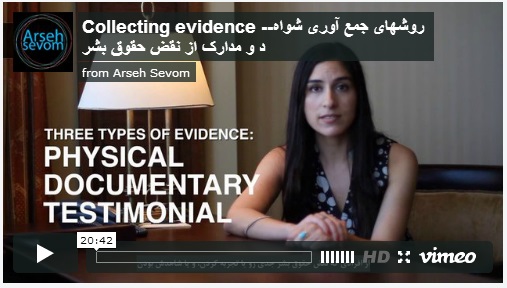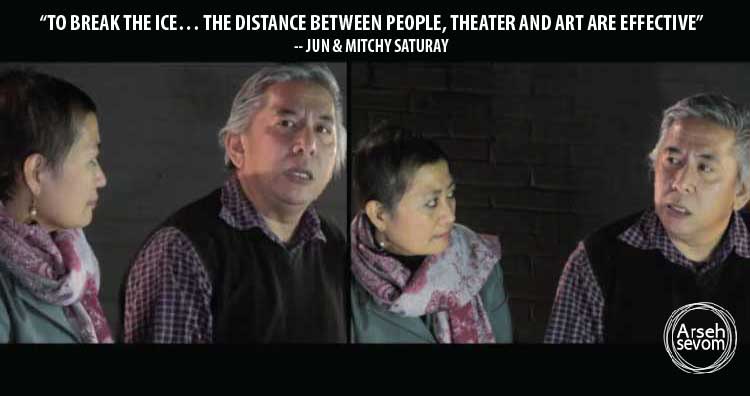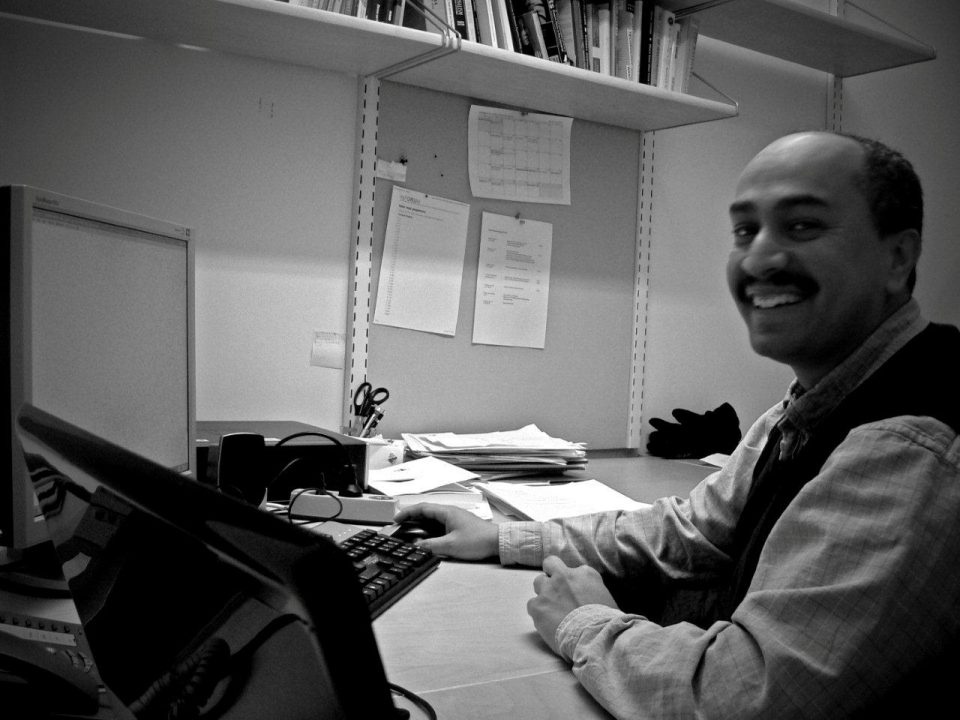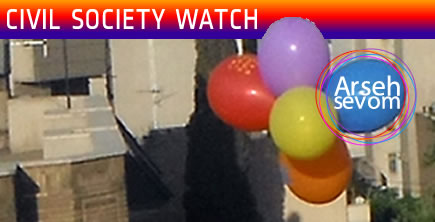
Rainbow Iran, War Against High Hemlines and Flyaway Hair, Ayatollahs Against Rapper
May 21, 2012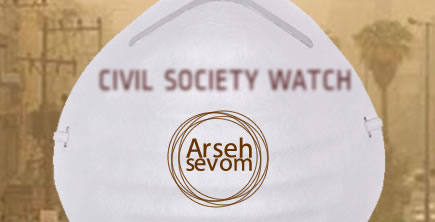
Dust Storms, House of Cinema, Student Protests, Defying Dress Restrictions
May 28, 2012Arseh Sevom — As people all over the world watch the Eurovision competition beaming in from Azerbaijan’s largest city, Baku, competing images of the country emerge. One is the clean, happy face of the music competition, while the other is one of oppression and control.
Sahand Sahebdivani of Mezrab Cultural Center spoke to Arjen de Wolff, current director of Radio Zamaneh, about his experiences working for the National Democratic Institute (NDI) in Azerbaijan. During the interview, De Wolff reflected on working in closed societies and the nature of democracy.
Transcript
Q: Why were you in Azerbaijan? Does it remain a dictatorship after the fall of the Soviet Union?
A: As to the question whether Azerbaijan is a dictatorship the answer is simple: yes it is.
If you look at the lists from human rights organisations around the world — from Freedom House, Human Rights Watch to Amnesty — you’ll see that Azerbaijan always scores poorly for corruption, democracy, election fraud, imprisoning dissents, politicians, journalists. Azerbaijan is an incredibly dictatorial land.
The fact that this is not so well-known has more to do with the fact that noone can spell the name of the country than anything else. It’s a small country that’s very rich in oil and gas reserves. There is a small group of powerful people, a few families that sit at the top, that hold the land in sway, but know how to project a good image abroad.
But if you are inside the country and look at the state of education, the state of public debate, if people can express their opinions, write them in a newspaper? Can they organize demonstrations? Take part in elections? …Then you see there are a lot of problems in that country.
Q: Did your work with NDI involve projects with the government or the people of the country?
A: Both actually. We worked with the government to a certain level to see if there was something we could do with the legislation to make it easier, more open. We worked with local media, to professionalise journalism, to see if they could make programmes and see how far they could go without being censored. We worked with dissident political parties to improve their professionalism, their ability to function politically, to learn how to make contact with the electorate.
We worked with small, lets call them citizen initiatives in the big city but also in the countryside to teach them how to organize and express their concerns for their neighbourhoods, and to gather and bring these to the people in power in their district. And so on many different levels we’ve tried to organize it, what you would find totally normal in the Netherlands, so that you can express your opinions, present you’re problems so that they are addressed, and that you can ask the government to do something about them.
Q: Didn’t you feel working with both sides compromised your projects and intentions?
A: Yes, that’s very difficult. Organisations, such as the one for which I worked, and actually all organisations that are involved with democracy, politics, human rights, and press freedom, that work in such an authoritarian land all have to deal with the same problem, and that is that you can only do as much as the authority in that land allows.
You want to be in that land and to work with the people who are having these problems directly, but the small price you must pay for this is that you must work with a government that is not so friendly, and yet you must keep on a friendly footing with them because if you do not you will be thrown out of the country and will not be allowed to work there again.
In that case you would have to try to work with the people in such a land from Amsterdam, Paris, or Washington. Typically these countries are very closed and it’s very difficult to communicate from outside — especially if you want to have conversations about anything politically sensitive. Because post is monitored, the internet is monitored, telephones are monitored.
So you want to be in that country but at the same time that puts limits on what you can say and do and you must always be very careful to find a balance between on the one hand retaining permission to stay, and on the other doing enough so you can make some meaningful difference without it being too superficial.
Q: Were there moments you compromised and regretted doing so?
A: That’s a good question, one that I’ve often asked myself.
Personally I’ve been arrested a number of times, not only in Azerbaijan but also in Russia where I’ve also worked. That was at a moment or through something I felt I had to do even though I knew beforehand I would be stepping over a line that would not please the security police.
May I give a concrete example? During the run up to the presidential elections in Azerbaijan which we already knew would be totally fraudulent, we wanted to set up an observing commission, not an international commission. But we worked with a local organisation which we had trained to observe elections, to see if they run honestly or dishonestly. It consisted entirely of Azerbaijanies and for that you must be well organised through the whole land.
The only way to do this well was to travel throughout the whole country, to the various branches of the organisation, to train people to do that work. At a certain point we received a warning about a region of Azerbaijan called Nakhchivan… that’s a sort of exclave of Azerbaijan. You can only fly there since it is not connected with the rest of Azerbaijan, Azerbaijan is at war with it’s neighbour Armenia, so you have to fly there.
Its a strange, even more dictatorial, more difficult zone. We received advice not to go there, not to work with the people there to train them because there could be bad consequences for them, and not just for them, but their families.
Eventually we accepted this advice and we didn’t go there to train people with the consequence that in that important area there was no objective witness to the election process, which in turn calls into question the validity of the election results for the whole country. In retrospect I think we should have gone there but we felt too tied and we should have resisted that. And unfortunately there are more similar instances.
Q: How does a foreign entity bring democracy to a country like Azerbaijan?
A: One of the most difficult things about introducing democracy… and those people prefer not to call it that. If I can begin with that, it’s very difficult to avoid bringing with your own Western image of democracy and to teach it to these people who know nothing of it. I prefer not to see it like that and that is not how I work.
What we try to do is support those people already there who very much want something different for their own country. So we never felt the need to bring something they don’t themselves want. It is more: “you want more democracy, more openness, less corruption, a constitution, a more honest legal system, now we have the appropriate knowledge to support you in that.”
To return to your main question, and you see it in the former Soviet Union and many other lands, a rather crude and overly optimistic image of what democracy can bring. Often people think “when there is democracy then everything will be fine, I won’t have to live in my dilapidated apartment, I’ll be rich, I’ll have work, there will be good schools a good health system ….” that is of course not the case.
Democracy is a means to govern the society in such a way that everyone can take part on an equal basis. But you don’t become rich automatically. Democracy in itself is not a process, it’s not a voting booth, it is a culture that needs to live in you mind. It’s not something that is just for election time. It is something that you must bring up your children with, a sense of citizenship and openness, a willingness to share information with people and not hold everything for yourself. Democracy is practically a state of mind.
In the beginning when you explain this to people it can be a bit of a shock and you often see that organisations that don’t explain carefully enough, don’t begin with the people themselves in regard to learning the democratic principals, that they actually create disappointment. People think, “We’ll just try this democracy, it’s a system and afterwards everything will be better.” No, democracy is a method, and it can be badly misused.
You can create a democratic form and system, but that doesn’t mean to say that it will have the soul or essence of democracy. To infuse the land with the soul of democracy is something the people themselves have to do and should effect all facets of their life, not just the ability to vote.
Q: What’s the state of the country since you left?
A: I would like to be able to say that it is better than it was but unfortunately that’s not so. The last few year has seen a deterioration in Azerbaijan, more journalists have been detained, politicians that before the government didn’t dare to imprison because they were too well known, even though they were known to be dissidents, they have now been taken into custody.
Many young internet activists, bloggers etc. are regularly detained. Two good friends and colleagues of mine who took part in the training were taken and sat in jail for a long time. They’ve recently been released.
I compare work for democracy and human rights, and I do this a bit to keep myself motivated, I compare it to: it is winter outside, storm, rain, hail and snow and it is dark. There is a wonderful convertible in my garage, it’s a beautiful car, it’s open.
At a certain moment the sun will come out but in the meantime you must do all the maintenance work, oiling and other upkeep, otherwise you won’t be able to drive it when the sun shines.
Unfortunately that is all you can do in that kind of land. You can’t, certainly as a foreign organisation, arrange that the sun shines, that is what the people themselves must do. What you can do is make sure that when the weather improves there are enough people there trained in a modern form of democracy, with legal rights, and honest elections, and free press; that people have the mind set to know what it means to live in an open society with open debate, to be able to resolve conflict peacefully and to share the cake fairly so it doesn’t disappear into a few corrupt pockets.
You try to prepare people for the great change but that great change they have to bring themselves.


